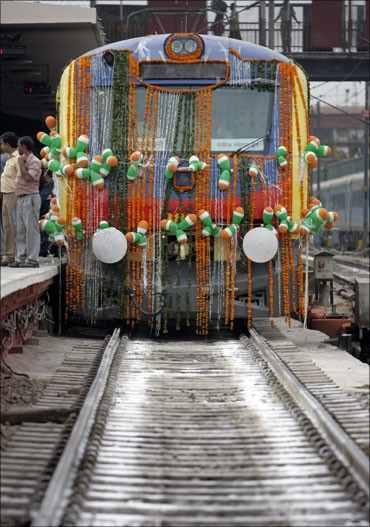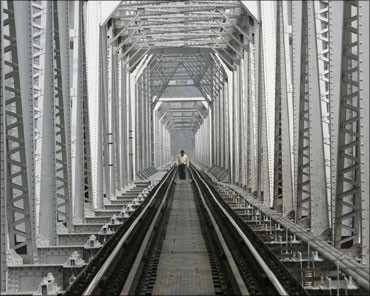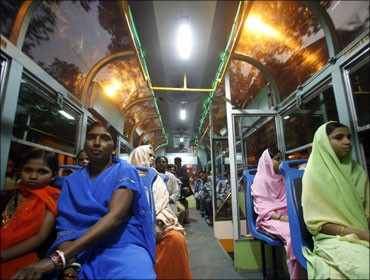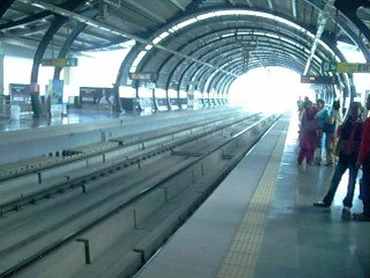 | « Back to article | Print this article |
Railways may stray on to deficit track next year
The Indian Railways is set to record a marginal surplus in the current financial year -- much lower than the Rs 5,258 crore (Rs 52.58 billion) budgeted in February 2011. But, the fall is only a trailer, considering the country's largest passenger and goods transport network is likely to go into deficit next year.
According to an assessment by the government, the deficit for the railways in 2012-13 could be as high as Rs 2,162 crore (Rs 21.62 billion), unless it goes for another round of freight rationalisation, introduces some radical changes in passenger fares like dynamic pricing or strengthens its alternative revenue sources, that is public-private partnership (PPP) initiatives, land use and advertisements.
The Railway Budget for 2012-13 is scheduled to be presented on March 14.
For Rediff Realtime News, click here
Click NEXT to read more...Railways may stray on to deficit track next year
The railways' financial problems are likely to worsen in the following years, as the government's estimates show its deficit will increase in the coming years if no additional resource mobilisation measures are initiated.
The deficit is likely to stay for the next four years till 2015-16. And, just as it may start to get out of that phase, the Seventh Pay Commission will be on the anvil in 2016-17. Passenger fares have been untouched for the past eight years.
Moreover, the railways have not been able to capitalise adequately on alternative means of financing, with the result that only a fraction of the Plan outlay has been financed by PPP initiatives, says an official.
Click NEXT to read more...
Railways may stray on to deficit track next year
The composite index of all the inputs in the railways (including fuel oil and staff cost) has shot up by around 100 per cent, but the increase in freight has been only 35-40 per cent in the past eight years.
According to projections by the 12th Plan Working Group, the total receipts of the railways, including Gross Traffic Receipts, are expected to be around Rs 1,18,903 crore (Rs 1,189.03 billion) in 2012-13 based on a trend analysis.
After taking into account the ordinary working expenses of Rs 86,504 crore (Rs 865.04 billion), miscellaneous expenditure of Rs 1,055 crore (Rs 10.55 billion), appropriation to the pension fund of Rs 18,144 crore (Rs 181.44 billion) and dividend payment of Rs 7,858 crore (Rs 78.58 billion), the internal generation left after spending on non-plan expenditure is around Rs 5,342 crore (Rs 53.42 billion).
Click NEXT to read more...
Railways may stray on to deficit track next year
A payment of Rs 7,504 crore (Rs 75.04 billion) for the capital portion of the Indian Railway Finance Corporation lease charges would, however, turn the net internal generation negative by around Rs 2,162 crore (Rs 21.62 billion).
The Indian Railways' financial problems in the following years may only aggravate, according to the government's assessment.
The compounded annual growth rate (CAGR) in railway expenditure at 11 per cent over the next five years is likely to be marginally more by 0.2 per cent than the growth rate in receipts, which will squeeze the surplus further. Significantly, staff costs during the next five years are expected to show a CAGR of 10.6 per cent.
Click NEXT to read more...
Railways may stray on to deficit track next year
A net addition of 100,000 employees by 2012-13 will result in additional expenditure of Rs 2,400 crore (Rs 24 billion) per annum. After the implementation of the Sixth Pay Commission recommendations, there was an annual increase of three per cent in salaries and allowances.
The dearness allowance (DA) is also expected to increase 14 per cent every year. The DA may see another increase of at least seven per cent in March 2012.
The calculation of what should constitute surplus will also be a crucial factor. The surplus is currently calculated after the deduction of all non-plan expenditure, appropriation to the pension fund, depreciation reserve fund and dividend payment.
Under Lalu Prasad as minister, the surplus was calculated before providing for depreciation, interest on deposits and lease charges.
Click NEXT to read more...
Railways may stray on to deficit track next year
In 2007-08, the three heads (depreciation, interest on deposits and lease charges) accounted for around Rs 8,400 crore (Rs 84 billion) of the Rs 25,000 crore (Rs 250 billion) shown as surplus. The new administration has since reversed that approach.
A railway official admitted there was a tendency to inflate the surplus and show the operating ratio below 100 per cent by making less allocations to the Depreciation Reserve Fund (DRF) and pension fund.
Cutting corners on DRF impacts the safety of passengers. The rapid growth rate in non-plan expenditure, including staff costs and other input costs, will make the jugglery of the operating ratio and surplus an uphill task from the next year onwards.
In 2009-10, for instance, the railways could manage to show just Rs 75 lakh as surplus after a dividend payout of around Rs 5,500 crore (Rs 55 billion).





